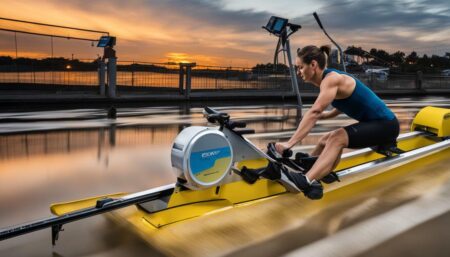When it comes to selecting the right exercise equipment, rowing machines are a popular choice due to their ability to provide a full-body workout. However, with so many options available, making the right decision can be overwhelming. Water rowers and magnetic rowers are two of the most popular types of rowing machines on the market today. While both offer unique benefits, it is essential to determine which one will suit your needs and fitness goals.
In this article, we will provide an in-depth comparison of water rowers and magnetic rowers. We will explore their unique features, benefits, and drawbacks, allowing you to make an informed choice when selecting the best rowing machine for your fitness routine.
Key Takeaways:
- Water rowers and magnetic rowers are two of the most popular types of rowing machines available in the market.
- Both offer unique benefits and drawbacks, making it essential to determine which one will suit your individual needs and fitness goals.
- Choosing the right rower requires considering factors such as resistance type, noise levels, space requirements, and overall durability.
- Water rowers offer a more natural rowing experience due to water resistance, while magnetic rowers allow for precise intensity adjustments and quiet operation.
- The final decision ultimately depends on personal preferences, goals, and budget.
Understanding Water Rowers
When it comes to choosing a rowing machine, water rowers have gained immense popularity in recent years due to their unique resistance mechanism. In this section, we will provide an overview of water rowers, their advantages, and how they differ from magnetic rowers.
Water Rower Reviews
Water rowers are a great option for fitness enthusiasts who are looking for a low-impact, full-body workout. According to popular reviews, they provide a realistic rowing experience, mimicking the sensation of rowing on water, which many users find highly satisfying.
Furthermore, water rowers are lauded for their quiet operation, making them a great option for home use. They are also known for their smooth rowing motion, which is easy on the joints and provides an effective workout for a wide range of fitness levels.
Advantages of Water Rowers
One of the key advantages of water rowers is their resistance mechanism. The resistance is created by the paddles that are suspended in the water tank, providing a natural and smooth resistance that mimics the feel of rowing in water. This offers a more realistic experience compared to magnetic rowers, which use electromagnets to generate resistance.
Water rowers also have an aesthetic appeal due to their elegant and stylish design. They are often made of high-quality wood with a sleek finish, making them a great addition to any home gym or living room.
Water Resistance vs Magnetic Resistance in Rowers
While water rowers offer a unique resistance mechanism, magnetic rowers have their own set of advantages. Magnetic resistance is adjustable, making it easier for users to customize their workout intensity. Additionally, magnetic rowers are often more affordable and compact than water rowers.
However, water rowers are often preferred by users who are looking for a more authentic and immersive rowing experience, as well as those who value the low-impact nature of water resistance. They also require less maintenance compared to magnetic rowers, as there are no moving parts that need to be replaced over time.
Ultimately, the choice between water and magnetic resistance comes down to personal preference and fitness goals. Both types of rowers offer unique advantages and can provide an effective full-body workout.
Exploring Magnetic Rowers
Magnetic rowers have gained popularity in recent years due to their quiet operation, adjustable resistance levels, and compact design. They use a magnetic brake system to create resistance, which allows users to adjust the intensity of their workouts according to their fitness level and goals.
One of the top magnetic rowers on the market is the Concept2 Model D. It has been a favorite among fitness enthusiasts and professionals alike due to its durable construction, smooth performance, and digital performance monitor.
| Benefits of Magnetic Rowers | Magnetic Rower Comparison |
|---|---|
|
|
While magnetic rowers offer many benefits, they may not provide the same realistic rowing motion as water rowers. Nevertheless, their adjustable resistance levels and digital features make them a great option for users who prefer tailored workout programs and precise intensity control.
Differences Between Water and Magnetic Rowers
When it comes to choosing the right rowing machine for your fitness routine, it’s important to understand the differences between water and magnetic rowers. Both types of rowers offer unique features and benefits, making it crucial to evaluate your workout needs and preferences before making a decision.
Resistance Type: The primary difference between water and magnetic rowers is the type of resistance they offer. Water rowers use water resistance, which creates a more natural and smooth rowing motion. Magnetic rowers, on the other hand, use magnetic resistance, which allows for precise intensity adjustments and a quieter operation.
Maintenance Requirements: Water rowers require regular maintenance to prevent algae growth and ensure the water stays clean. Magnetic rowers, however, have fewer maintenance requirements and typically only require occasional cleaning.
Noise Levels: Water rowers tend to be louder due to the sound of the water splashing around in the tank. Magnetic rowers are generally quieter due to their magnets, making them a better option for people looking for a quieter workout machine.
Overall User Experience: Ultimately, the decision between water and magnetic rowers comes down to personal preference. Water rowers provide a more immersive and natural rowing experience, while magnetic rowers offer more customization and precision. It’s important to consider factors like space, noise, and maintenance requirements when choosing between the two.
Choosing Between Water and Magnetic Rowing Machines
When deciding between water and magnetic rowing machines, it’s important to consider your fitness goals, space limitations, and budget. If you’re looking for a more natural, full-body workout and don’t mind the added maintenance and noise, a water rower may be the best choice for you. If you prefer a quieter, more customizable workout and have limited space, a magnetic rower may be the better option.
Regardless of your choice, incorporating a rowing machine into your fitness routine can provide a low-impact, full-body workout that can help improve cardiovascular health, build endurance, and strengthen multiple muscle groups.
Benefits of Water Rowers
Water rowers have become increasingly popular due to their unique features and benefits. In addition to providing a low-impact, full-body workout, water rowers offer several advantages over other types of rowing machines.
Engages Multiple Muscle Groups
Water rowing machines offer a more realistic rowing experience, using a water flywheel to mimic the feel of rowing on water. This creates a smooth and natural rowing motion that engages multiple muscle groups, including the legs, core, back, and arms.
This low-impact exercise is perfect for users of all fitness levels, allowing you to work out for longer periods without putting unnecessary strain on your joints.
Promotes Cardiovascular Health
Rowing is an excellent cardiovascular exercise, helping to improve heart health and strengthen the cardiovascular system. The rhythmic motion of rowing helps to increase blood flow, oxygenation, and circulation throughout the body, which can lead to improved endurance and overall fitness levels.
Accommodates Different Fitness Levels
Water rowers offer adjustable resistance levels, allowing users to customize their workout intensity to suit their fitness level and goals. This makes it an excellent choice for users who are new to rowing or those who are looking to challenge themselves with more advanced workouts.
Effective Workouts
Water rower workouts are effective in burning calories and losing weight while improving strength and stamina. According to a study by Harvard Health Publishing, rowing can burn up to 250 calories in just 30 minutes of moderate effort.
In addition, water rowers provide a low-impact workout that reduces stress on the joints and makes it a suitable exercise for individuals who may have injuries or arthritis.
Overall, water rowers offer an enjoyable and effective way to get a full-body workout while improving cardiovascular health and fitness levels.
Advantages of Magnetic Rowers
Magnetic rowing machines are gaining popularity among fitness enthusiasts thanks to their many benefits.
One of the primary advantages of magnetic rowers is the ability to adjust resistance levels precisely. Users can choose from a wide range of resistance levels, making it suitable for those who prefer customized workout programs.
In addition to adjustable resistance, most magnetic rowers come equipped with digital displays that provide real-time feedback on important workout metrics, such as distance, time, calories burned, and heart rate. Some models also include built-in workout programs that vary in intensity and duration, allowing users to choose the program that best suits their fitness level and goals.
Another benefit of magnetic rowers is their quiet operation. Unlike water rowers, magnetic rowers do not produce any sound while in use, making them a great option for those who prefer to work out in a quiet environment.
Magnetic rowers are also typically more compact and lightweight than water rowers, making them a great option for those with limited space in their homes.
Overall, magnetic rowers offer a unique set of benefits that make them a great option for users who want a customizable, quiet, and space-efficient workout machine.
Choosing the Right Rower for You
Choosing between water and magnetic rowing machines can be a daunting task, especially if you’re new to rowing. To make the right choice, consider the following factors:
Resistance Type
Water rowers rely on water resistance, while magnetic rowers use magnets to provide resistance. If you’re looking for a more natural rowing experience that closely mimics the sensation of rowing on water, a water rower is a good choice. However, if you prefer more precise control over the intensity of your workouts, a magnetic rower may be the better option.
Space Requirements
Water rowers are generally larger and heavier than magnetic rowers, which can make them more difficult to move and store. If you have limited space in your home gym, a magnetic rower may be a better choice.
Noise Levels
Water rowers tend to produce a gentle, soothing sound that can be quite relaxing, while magnetic rowers are generally quieter. If you prefer a quieter workout environment, a magnetic rower may be the better choice.
Durability
Both water and magnetic rowers are built to last, but water rowers require more maintenance due to the water-filled tank that powers the machine. If you’re looking for a low-maintenance option, a magnetic rower may be the better choice.
Overall, the right rower for you depends on your personal preferences and fitness goals. Consider the factors above, as well as your budget, before making a final decision. Regardless of which type of rower you choose, a rowing machine is an excellent investment in your health and fitness.
Water Rower vs Magnetic Rower: A Comprehensive Comparison
Now that we have explored the features and benefits of both water rowers and magnetic rowers, let’s compare them in a comprehensive manner.
| Feature | Water Rower | Magnetic Rower |
|---|---|---|
| Resistance Type | Water resistance provides a natural and smooth rowing experience, mimicking the feel of rowing on water. Resistance can be adjusted by changing the amount of water in the tank. | Magnetic resistance offers a quieter workout and allows for precise resistance adjustments according to individual preferences. The resistance is created by a magnet that moves closer or farther away from the flywheel. |
| Noise Level | Water rowers produce a swishing sound as the paddles move through the water, which some users find soothing. However, the sound may be too loud for those who prefer a quiet workout environment. | Magnetic rowers operate quietly, making them an ideal choice for those who want to exercise without disturbing others. |
| Maintenance | Water rowers require occasional maintenance to keep the water clean and prevent algae growth. The tank should also be emptied and refilled periodically. | Magnetic rowers have minimal maintenance needs, and there is no need to add or remove water from the machine. |
| Price | Water rowers tend to be more expensive than magnetic rowers due to their intricate design and use of water resistance. | Magnetic rowers are generally more affordable than water rowers and offer excellent value for money. |
| Workout Programs | Water rowers do not typically come with built-in workout programs or digital displays, but some models offer heart rate monitoring. | Magnetic rowers often come with digital displays that can track distance, speed, calories burned, and other metrics. They also tend to offer a range of pre-set workout programs to choose from. |
| User Experience | Water rowers provide a realistic rowing experience that engages multiple muscle groups and offers a full-body workout. They also tend to be more visually appealing. | Magnetic rowers allow for precise resistance adjustments and are suitable for users who prefer customized workout programs. They also tend to be more compact and easier to store. |
Based on this comprehensive comparison, it is clear that both types of rowers offer unique features and benefits. Ultimately, the choice between a water rower and a magnetic rower depends on individual preferences, fitness goals, and budget. We recommend considering the factors discussed in this article and trying out both types of rowers if possible before making a final decision.
Choosing the Right Rower for You
When it comes to choosing between water rowers and magnetic rowers, there are several factors to consider before making a final decision. Here are some important things to keep in mind:
- Fitness goals: Consider your fitness goals and how rowing fits into your overall fitness routine. Are you looking for a low-impact, full-body workout that can burn calories and improve cardiovascular health? Or are you focused on building strength and endurance?
- Resistance type: Think about which type of resistance you prefer. Do you prefer the smooth, natural feel of water resistance or the precise, customizable resistance of magnetic rowers?
- Space requirements: Consider the amount of space you have available in your home gym or workout area. Water rowers tend to be larger and heavier than magnetic rowers, so make sure you have enough room to accommodate your chosen model.
- Noise levels: Think about the noise levels of each rower. Water rowers tend to be quieter than magnetic rowers, making them a good option for home use.
- Durability: Consider the overall durability of each rowing machine. Water rowers require more maintenance due to the water used as resistance, while magnetic rowers tend to have fewer moving parts and require less upkeep.
- Budget: Finally, consider your budget. Water rowers tend to be more expensive than magnetic rowers, so make sure you choose a model that fits within your price range.
By taking these factors into consideration, you can make an informed decision about which type of rowing machine is right for you and your fitness goals.
Conclusion
Choosing the right rowing machine can be overwhelming, but after reading this article, you should have a clearer understanding of the differences between water rowers and magnetic rowers.
Water rowers offer a more natural rowing experience, engaging multiple muscle groups, promoting cardio health, and accommodating users of various fitness levels. Magnetic rowers, on the other hand, provide precise intensity adjustments, personalized workout programs, and additional features like digital displays and heart rate monitors.
Ultimately, the right choice depends on your individual needs and preferences. Consider factors like resistance type, space requirements, noise levels, and overall durability when making your decision.
Whether you choose a water rower or a magnetic rower, both provide an excellent way to work from the comfort of your own home. Start your fitness journey with confidence and enjoy the benefits of rowing for years to come!
FAQ
Q: What is the difference between a water rower and a magnetic rower?
A: Water rowers use water as the resistance mechanism, creating a smooth and realistic rowing motion. Magnetic rowers, on the other hand, use magnets to provide adjustable resistance levels.
Q: What are the benefits of using a water rower?
A: Water rowers provide a full-body workout, engage multiple muscle groups, promote cardiovascular health, and accommodate users of various fitness levels. They offer a more natural rowing experience compared to other types of rowing machines.
Q: What advantages do magnetic rowers have?
A: Magnetic rowers allow for precise intensity adjustments, making them suitable for users who prefer customized workout programs. They are also known for their quiet operation, compact design, and additional features such as digital displays and heart rate monitoring.
Q: How do I choose between a water rower and a magnetic rower?
A: When choosing between the two, consider factors such as resistance type, maintenance requirements, noise levels, and overall user experience. Think about your fitness goals, personal preferences, and budget to make an informed decision.
Q: What type of rower is best for me?
A: The best rower for you depends on your individual needs and preferences. If you prioritize a realistic rowing experience and a full-body workout, a water rower may be the right choice. If you prefer precise intensity adjustments and additional features, a magnetic rower might be more suitable.
Q: Are water rowers or magnetic rowers more durable?
A: Both types of rowers can be durable if properly maintained. Water rowers may require occasional water changes and cleaning, while magnetic rowers generally require less maintenance. It is important to follow the manufacturer’s guidelines to ensure longevity and optimal performance.
Q: Can I use a water rower or a magnetic rower if I have joint issues?
A: Water rowers offer a low-impact workout that can be gentle on the joints. The smooth and fluid motion of water rowing can be beneficial for individuals with joint issues. Magnetic rowers also provide a low-impact workout, but it is essential to adjust the resistance level according to your comfort and physical capabilities.
Q: How much space do I need for a water or magnetic rower?
A: The space requirement for a rowing machine will vary depending on the specific model. Generally, both water and magnetic rowers have a similar footprint, but it is advisable to check the dimensions provided by the manufacturer to ensure proper space allocation in your home or gym.
Q: Can I fold a water or magnetic rower for storage?
A: Some rowing machines, including both water and magnetic rowers, come with folding mechanisms that allow for easier storage in compact spaces. However, not all models are foldable, so it is important to check the specifications of the particular rower you are interested in.
Q: How do I maintain a water or magnetic rower?
A: To maintain a water rower, you may need to periodically change the water and clean the tank to prevent any build-up or mold. Magnetic rowers usually require less maintenance, but it is recommended to wipe down the machine after use and ensure that the magnetic resistance system is in good working condition.






